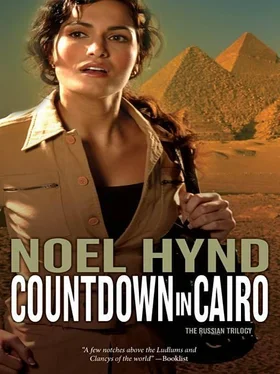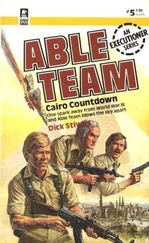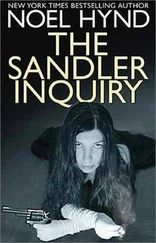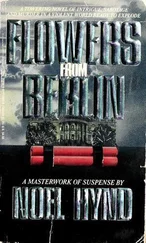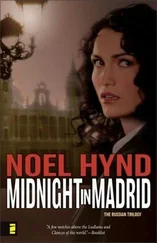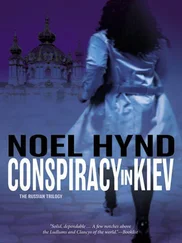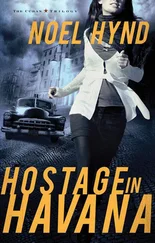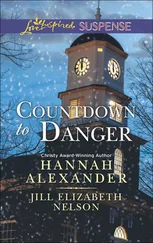Noel Hynd - Countdown in Cairo
Здесь есть возможность читать онлайн «Noel Hynd - Countdown in Cairo» весь текст электронной книги совершенно бесплатно (целиком полную версию без сокращений). В некоторых случаях можно слушать аудио, скачать через торрент в формате fb2 и присутствует краткое содержание. Жанр: Политический детектив, на английском языке. Описание произведения, (предисловие) а так же отзывы посетителей доступны на портале библиотеки ЛибКат.
- Название:Countdown in Cairo
- Автор:
- Жанр:
- Год:неизвестен
- ISBN:нет данных
- Рейтинг книги:3 / 5. Голосов: 1
-
Избранное:Добавить в избранное
- Отзывы:
-
Ваша оценка:
- 60
- 1
- 2
- 3
- 4
- 5
Countdown in Cairo: краткое содержание, описание и аннотация
Предлагаем к чтению аннотацию, описание, краткое содержание или предисловие (зависит от того, что написал сам автор книги «Countdown in Cairo»). Если вы не нашли необходимую информацию о книге — напишите в комментариях, мы постараемся отыскать её.
Countdown in Cairo — читать онлайн бесплатно полную книгу (весь текст) целиком
Ниже представлен текст книги, разбитый по страницам. Система сохранения места последней прочитанной страницы, позволяет с удобством читать онлайн бесплатно книгу «Countdown in Cairo», без необходимости каждый раз заново искать на чём Вы остановились. Поставьте закладку, и сможете в любой момент перейти на страницу, на которой закончили чтение.
Интервал:
Закладка:
“Right,” Federov laughed. “Reselling subsidized Russian gas at high profits is a common way of doing business in Ukraine,” he said.
“It’s a common insiders’ swindle, is what you mean,” she said.
“That is what Westerners think,” he said, “but it is how business is commonly conducted in Ukraine.”
“Maybe so. But here’s where Putin had a problem. Yanukovich was not elected. His rival, Viktor Yushchenko, survived dioxin poisoning and emerged as the symbol against post-Soviet rule. And the next thing you knew, the ‘Orange Revolution’ was under way. Kuchma’s government falsified an election victory for Yanukovich. But this time the government couldn’t sell the big lie to the population. Hundreds of thousands of demonstrators took to the streets all over Ukraine. The demonstrators were out in all of the cities and towns demanding that their voices be heard. In response, seeing an impending civil war, the Ukrainian courts, newly open and anxious to show their independence, demanded a new vote. Putin was on the defensive again. What to do? How to keep his man Yanukovich in power? Send in tanks? The army? Ukraine was a big place compared with, say, Hungary in 1956 or Czechoslovakia in 1968, and the mood was explosive.”
Federov nodded.
“But you know the story better than I do, Yuri. Putin is nothing if not a brilliant strategist. What was his weapon in Ukraine?”
“Gas,” Federov said, his eyes narrowed. “Gas, and the deadly cold of the Ukrainian winter.”
“Exactly. And what did he do?”
“Putin announced that the gas agreement with Ukraine was now void,” Federov recalled. “Ukraine would have to pay competitive market rates, now more than five times the previous offer.” He paused. “That meant Ukrainians could freeze to death because they couldn’t afford heat.”
“That’s correct,” Alex said. “Gazprom, Russia’s state gas monopoly, set a deadline for late 2005. The threat’s timing was carefully chosen, and the many ironies were inescapable. Ukraine faced the prospect of gas shortages in winter. And Putin, the KGB man who had given a Soviet-style energy subsidy to a nation to buy its loyalty, was now lecturing Europe about the need for market rates.” She shook her head. “Brilliant, but unconscionable,” she said. “Ukraine had been the breadbasket of the Soviet Union in the 1930s but faced the Holodomar, the fake famine of the Stalin years when the Soviets exported all food and grain from Ukraine. And now Putin had raised a similar specter. Now there would be a shortage of natural gas, never mind that Ukraine had a surfeit of natural gas and should have been self-sufficient.”
Federov nodded. A gangster understood another gangster.
“The reformer, Yushchenko, resisted Putin’s deadline,” Federov remembered. “So Putin increased the crisis more, hey? The Russians cut the pressure in gas pipelines feeding Ukraine. Then the same pipelines that fed Europe started to fall in pressure too. Putin was squeezing everyone. It was early winter. No one in Berlin and Paris and Vienna wants to be cold.”
“I’ve done my homework, Yuri,” she said. “Most gas that arrives in Europe travels through lines that pass through Ukraine. Every elected leader in Western Europe was furious with him. What was he thinking?”
Federov laughed.
“Ukraine had overturned Putin’s falsified election,” Alex said. “Putin was furious. So he cut off gas to Western Europeans so that Western Europe would pressure Ukraine and Yushchenko.” She paused. “And if my theory holds, Yuri,” Alex said, “that’s where you came in! You and your phantom company, the Caspian Group. You were the most powerful local man in the underworld. You controlled everything from black-market munitions, to sea-going merchant vessels, to stables of women. But energy, natural gas, was a big item in your stock, wasn’t it? You had your own huge supplies stashed away at depots in Odessa and Sebastopol. So Putin and his people came to you and so did Yushchenko. You brokered a deal. I have a CIA memo all about it, and I finally learned of the televised press conference that you attended but never mentioned to me. But the deal wasn’t known in the West until about six months ago, about the same time that Michael Cerny went underground.”
“Yushchenko was trapped by Putin’s power play with the gas,” Federov confirmed.
“If Yushchenko stayed in power,” Alex continued, “millions of Ukrainians would have frozen to death. A new Ukrainian genocide. They would have been begging the Russians to send tanks in to remove Yushchenko and reopen the pipelines. But if Yushchenko resigned, Ukraine would be back in the old Soviet sphere of influence, Gazprom would have controlled the energy, and eventually the country would have been doubly at the mercy of Russia again, first on energy production and second in terms of political domination. There’s no secret that the old band of crooks and criminals from the Kuchmar regime would have been back. Correct?”
“Correct.”
“So you offered both sides a way out: the new reform government could buy gas through the Caspian Group at a compromise price. It was just enough to override the Russian shortages. But as a deal, it was a stinker. Insiders were greatly profiting. Such as you, such as the Putin regime, such as Yushchenko’s people. But most of all, the deal that you engineered was to Putin’s advantage in two significant ways. He had compelled Ukraine to accept his terms. And he had dirtied Yushchenko with a gas contract that sullied his government and image as a reformer.”
“There was a third too, hey?” Federov said.
“What was that?”
“Putin had shown Europe that he could stand up to Western pressure and spit in their eyes,” he said. “His predecessor, Yeltsin, the white-haired old capon, never did that. Putin made Europe fear Russia again. Fifty years ago, East Germany, Czecho, Poland, Hungary: the Russians ruled with tanks. Now, not necessary. Putin rules with energy pipelines and petrodollars.”
“There’s an expression in English attributed to the artist Andy Warhol,” Alex said. “Everyone will be famous for fifteen minutes. You got yours out of the gas deal, didn’t you?”
His brow furrowed. “In what way?” he asked.
“You got to sit in that fake conference room on television with Putin and his minister of the interior and the head of the oil company,” she said. “By making you visible it was clear you had brokered the deal. That made you a very powerful man in Ukraine, didn’t it?”
“I already was.”
“But it made you more powerful, particularly in Ukraine. All hail the great Federov, right, if you don’t mind me giving you a variation of the old saying.”
“Sure,” he said with half a laugh. “If you want.” He licked his lips and smiled.
“Which brings us back to Mikhail Khodorkovsky,” she said. “The one-time oil baron of the old post-Soviet years. Where is Khodorkovsky today?”
A dark expression overtook Federov. “You know as well as I do. He is in a labor camp near the town of Krasnokamensk. It is a hellhole out near the Chinese border.”
“Seriously,” Alex said. “And the labor camp is attached to a uranium mine and processing plant, isn’t it? During the Soviet era, it was the type of place from which no one ever returned. A gulag, like Solzhenitsyn wrote about.”
“There are such horrible places,” Federov replied with another shudder. “If your benevolent God is real, you and I should be spared from ever going to such places.”
“And so should anyone else,” she said. “Khodorkovsky was a young man similar to you. Modest background, but highly ambitious. He used family, Communist party, and overtly criminal connections to grow very wealthy very quickly. He moved aggressively into what had previously been the state oil company, and founded a Russian petroleum company named Yukos. With deregulation, in the Yeltsin era, Khodorkovsky became so powerful that as of 2004, Khodorkovsky was the single wealthiest man in Russia, as well as one of the most powerful. And that didn’t sit well with Vladimir Putin, did it?”
Читать дальшеИнтервал:
Закладка:
Похожие книги на «Countdown in Cairo»
Представляем Вашему вниманию похожие книги на «Countdown in Cairo» списком для выбора. Мы отобрали схожую по названию и смыслу литературу в надежде предоставить читателям больше вариантов отыскать новые, интересные, ещё непрочитанные произведения.
Обсуждение, отзывы о книге «Countdown in Cairo» и просто собственные мнения читателей. Оставьте ваши комментарии, напишите, что Вы думаете о произведении, его смысле или главных героях. Укажите что конкретно понравилось, а что нет, и почему Вы так считаете.
